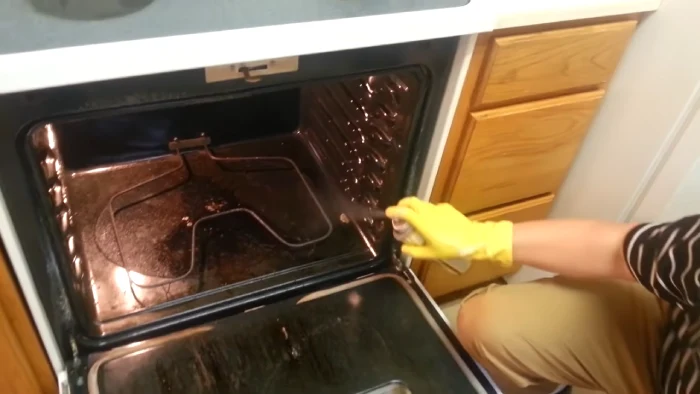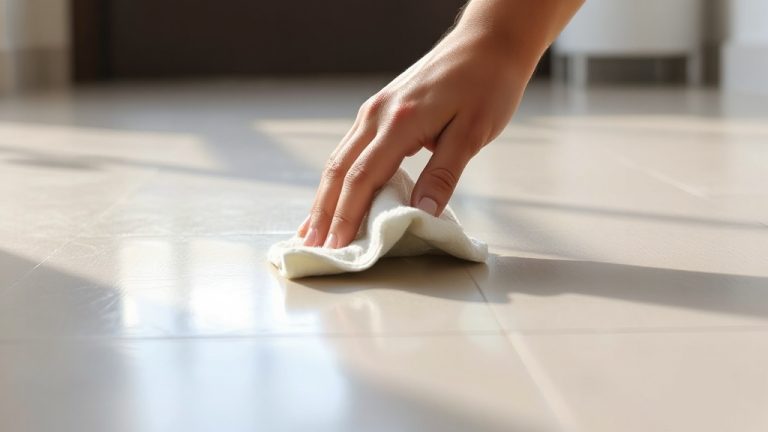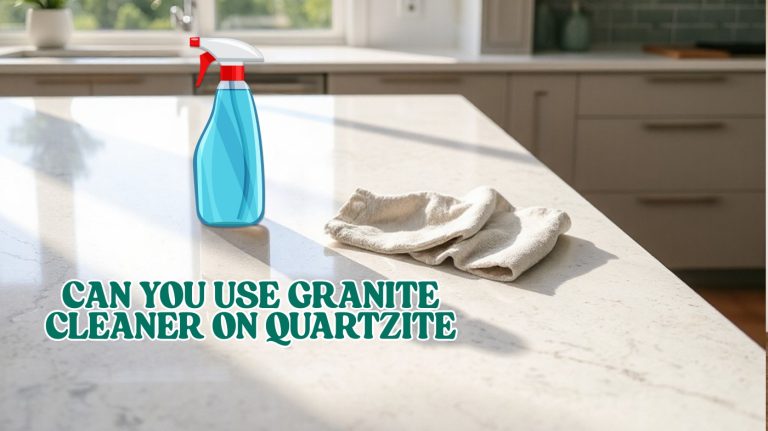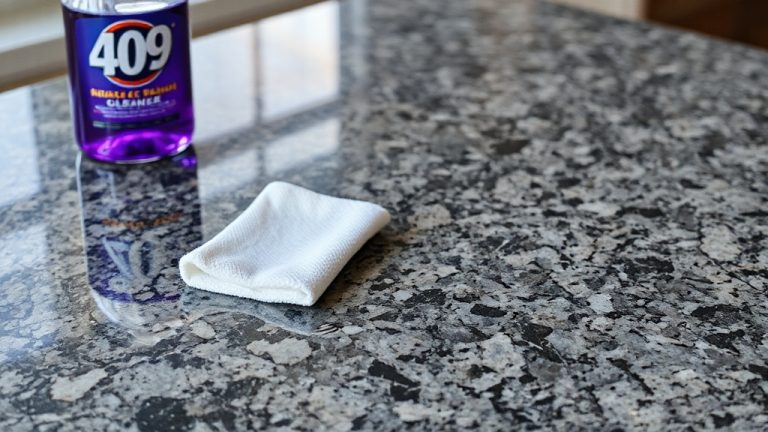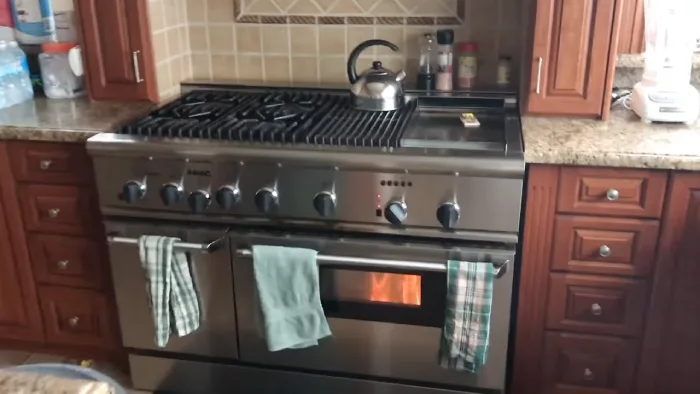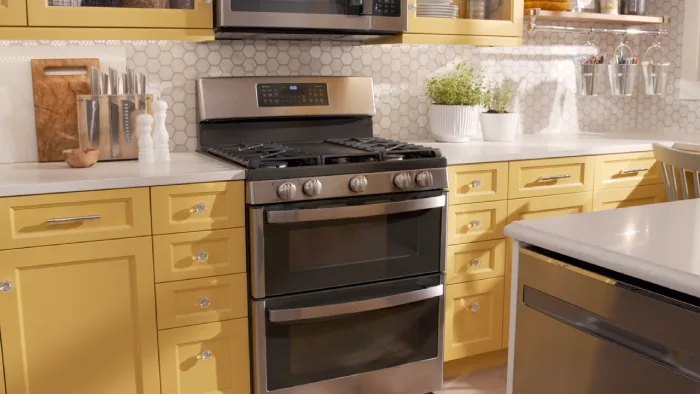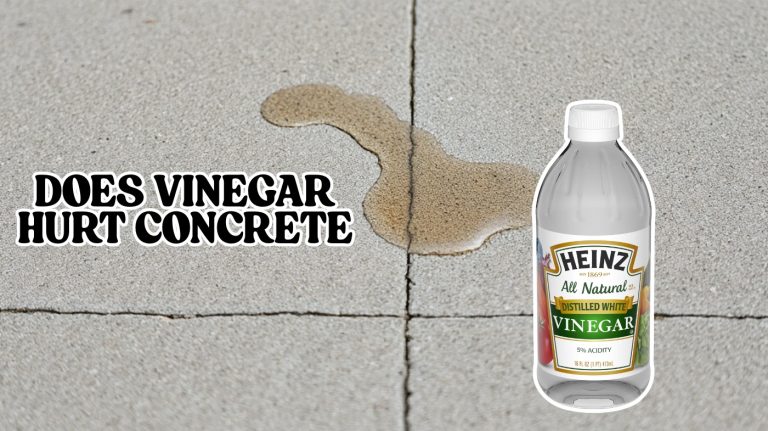Can You Use Oven Cleaner on Self Cleaning Ovens: 2 Reasons [Ensure Safety]
Are you tired of scrubbing your oven for hours on end? Self-cleaning ovens have become increasingly popular, promising an easy and efficient way to clean your appliances. However, people still wonder if they can use an oven cleaner on these self-cleaning ovens without damaging them.
The short answer is no. It is not recommended to use oven cleaner on a self-cleaning oven. While it may seem like a quick fix to get rid of leftover grime or grease, using harsh chemicals can harm the oven’s interior coating.
Today we will dive deeper into why you shouldn’t use an oven cleaner on self-cleaning ovens and what alternative cleaning methods are recommended.
Importance Of Reading Your Self-Cleaning Oven’s Manual
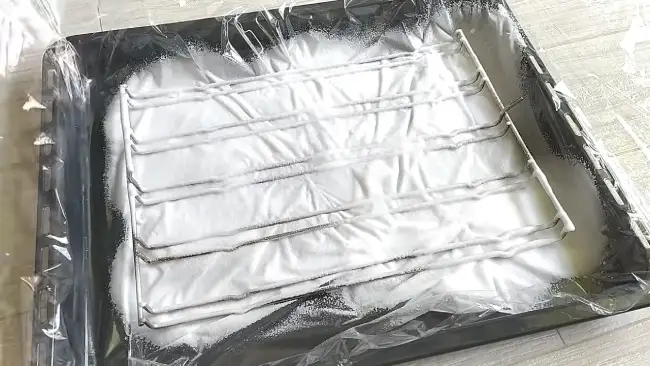
Maintaining your oven is vital to ensure its longevity and optimal performance. But before you start cleaning your self-cleaning oven or reach for that bottle of oven cleaner, you must read the manual thoroughly. The manual contains important information on safe materials when cleaning your oven.
Many people assume they can clean their self-cleaning ovens with any type of cleaner without reading the instructions first. Unfortunately, this assumption could damage your appliance or pose a safety risk. For instance, some cleaners may contain harsh chemicals that could react negatively with specific parts in the oven.
The manual provides detailed guidelines on maintaining and cleaning your self-cleaning oven effectively. Moreover, it also lists down the dos and don’ts when it comes to using particular cleaning solutions.
Therefore, taking time to read the manual will save you money and prevent potential hazards while ensuring your appliance remains functional for years.
Why Can’t You Use Oven Cleaner on Self Cleaning Ovens?
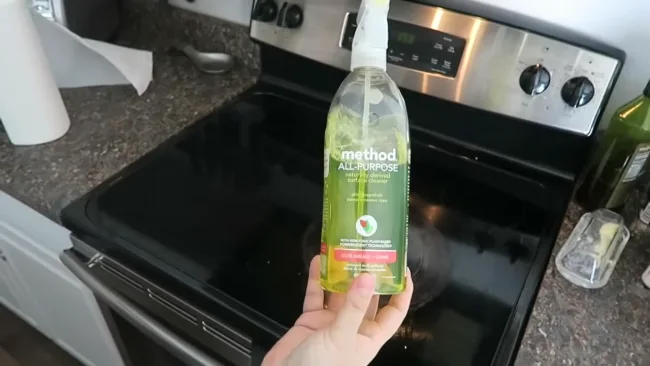
Many people wonder if they can use oven cleaning products on a self-cleaning oven, but the answer may not be what they expect. The risks of using oven cleaner on a self-cleaning oven are quite high.
Chemical Reaction
One of the most common mistakes people make is using oven cleaners on self-cleaning ovens. This can be dangerous because of the high temperatures that self-cleaning ovens use. The chemicals in oven cleaners can react with the heat and cause a fire.
Another chemical reaction to avoid is mixing bleach and ammonia. These two chemicals create a toxic gas called chloramine, irritating your eyes, nose, throat, and lungs. In severe cases, it could even lead to death. It’s essential always to check what chemicals you’re using before combining them.
Also, many oven cleaners contain harsh chemicals that can leave behind toxic fumes and residues that could contaminate food cooked in the oven later.
Damage Oven Interior Coating
Self-cleaning ovens have a special coating that helps them clean themselves by burning off any food residue or grease. But if you apply an oven cleaner to this coating, it can damage or even remove it entirely. This can result in your oven being less effective at self-cleaning in the future.
How to Safely Clean Your Self-Cleaning Oven?
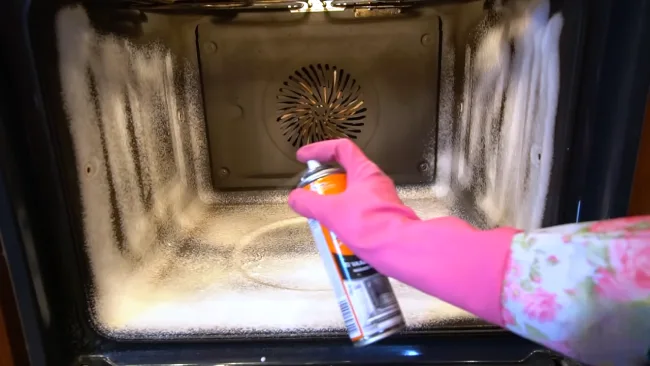
Keeping your oven clean is not only important for hygiene but also for ensuring its longevity. That’s why owning a self-cleaning oven is a game-changer, but do you know the right way to clean it without damaging it?
Follow these steps to clean your self-cleaning oven in no time safely.
STEP 1. Preparing the Oven
Are you tired of your self-cleaning oven still being dirty even after the cleaning cycle? It’s time to take matters into your own hands and give it a good deep clean. But before we get started, let’s talk about preparing the oven.
Start to remove any loose debris from inside the oven. This includes crumbs, burnt pieces of food, or anything else sticking to the walls or bottom of the oven. Use a damp cloth or vacuum to clean up as much as possible.
Then, check the manual for your specific oven model to see if an oven cleaner is recommended. Some self-cleaning ovens can handle commercial cleaners while others cannot. If it is safe to use an oven cleaner, follow all instructions carefully and wear gloves and eye protection during application.
STEP 2. Cleaning And Maintaining the Oven
Now that you have prepared your self-cleaning oven, it’s time to start cleaning and maintaining it.
Use a non-abrasive cleaner or a homemade baking soda and water solution to clean the oven. Apply the cleaner to the oven’s walls and bottom, avoiding heating elements or vents. Let the cleaner sit for at least 30 minutes before wiping it away with a soft damp cloth.
In addition to regular cleaning, check and replace damaged parts such as seals or gaskets. These small components help maintain heat inside your oven during cooking and can affect performance and safety if not in good condition.
When to Use an Oven Cleaner on Your Self-Cleaning Oven?
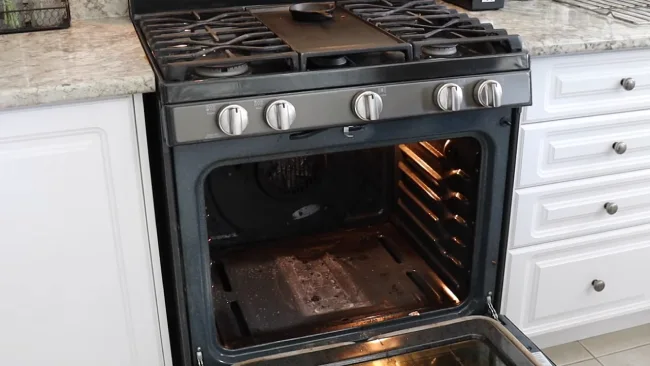
Proper maintenance of your self-cleaning oven is key, but sometimes it may need a deep clean. Cleaning an oven with a cleaner is possible, but only when it’s cool and you need it.
If your oven is heavily soiled, you may consider using an oven cleaner to help get it back to its original condition. There are a few times when you might want to use an oven cleaner:
#1 Proper Maintenance
Before reaching for that can of oven cleaner, ensure you understand how to maintain your appliance properly. One important thing to remember is that using harsh chemicals or abrasives on a self-cleaning oven could damage its interior.
Always read the manufacturer’s instructions before cleaning your self-cleaning oven to prevent any potential damage. Most manufacturers recommend avoiding abrasive cleaners as they can scratch the oven’s surface.
Instead, use mild detergents and warm water to wipe down spills and stains as soon as possible after cooking. This will keep your oven looking new and ensure it continues working efficiently.
#2 Heavy Soiling
If you notice heavy soiling in your self-cleaning oven, using an oven cleaner might be necessary. But you must choose a product that’s safe for use on self-cleaning ovens. Look for cleaners specifically labeled as suitable for these appliances and follow the manufacturer’s instructions carefully.
Before using an oven cleaner, try wiping down any visible grime with warm water and mild detergent first. If this doesn’t work, then move on to using an appropriate oven cleaner.
Spot Cleaning Vs. Deep Cleaning for Self-Cleaning Ovens
Spot cleaning is quick to take care of minor messes and surface dirt, while deep cleaning is more thorough and time-consuming.
Spot Cleaning
You’ve just cooked a delicious meal in your oven, but now there are unsightly stains and grease marks all over the inside. Grabbing some heavy-duty oven cleaner and scrubbing away is tempting, but wait. If you have a self-cleaning oven, it may not be necessary.
Self-cleaning ovens use high temperatures to burn off food residue and other grime, leaving only ash that can easily be wiped away. But if you need to spot-clean your self-cleaning oven, avoiding harsh chemicals like oven cleaners is essential.
Deep Cleaning
Deep cleaning typically involves more intensive methods, such as baking soda, vinegar solutions, or even professional oven cleaners. However, these methods should only be used sparingly and with caution.
Harsh chemicals can damage the interior of your oven and leave behind harmful residues that could affect future cooking. If you decide to clean your self-cleaning oven deep, follow all safety instructions provided by the manufacturer and wear protective gloves and clothing.
How to Prevent Your Self-Cleaning Oven From Getting Dirty?
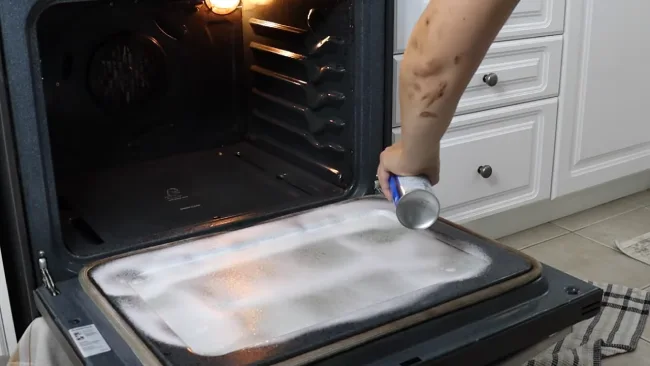
A self-cleaning oven is a blessing for those who love cooking, but cleaning can be daunting. Preventing it from getting dirty in the first place is the key. By following a few simple tips, you can say goodbye to the mess and maintain the efficiency of your oven.
Regular Cleaning
No one wants to spend hours scrubbing their oven clean. That’s why you must regularly maintain your oven and prevent it from getting too dirty in the first place. Regular cleaning can save you a lot of time.
One way to keep your oven clean is by wiping up spills as soon as they happen. This might seem like an obvious tip, but it’s easy to let spills go unnoticed or forget about them altogether. It only takes a few seconds to wipe up a spill with a damp cloth, and this small action can go a long way in preventing buildup and grime.
Spill Prevention
As mentioned earlier, spills must be cleaned immediately to keep your oven clean. It may seem like a small action, but it can greatly prevent buildup and grime.
Consider using baking sheets or foil when cooking messy foods like pizza or casseroles to prevent spills. This simple trick can catch any drips or spills before they can reach the bottom of your oven and create a mess.
Also, be mindful when placing dishes inside your oven to avoid accidentally knocking them over and causing spills.
Grease Prevention
Grease buildup can be a major culprit in creating stubborn stains and unpleasant odors inside your oven. To prevent this, consider using cooking methods that produce less grease, such as grilling or broiling instead of frying.
Another tip is to use non-stick cookware when possible, as this can reduce the amount of oil needed for cooking. Also, it’s important to regularly clean any grease traps or filters in your oven hood to ensure proper ventilation and prevent excess grease from accumulating inside your oven.
Alternatives to Toxic Oven Cleaners for Self-Cleaning Ovens
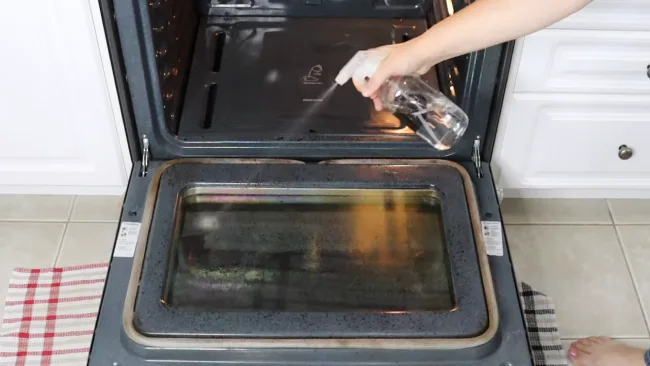
Before you reach for that oven cleaner, consider the potential risks it poses to your health and the environment. These harsh chemicals can release toxic fumes into your home and contaminate water sources if not disposed of properly. Fortunately, non-toxic alternatives are available to do the job just as effectively.
One option is baking soda mixed with vinegar or lemon juice. This natural combination creates a gentle abrasive paste that can cut through grime without damaging surfaces.
Another alternative is using steam to loosen up stubborn stains before wiping them away with a microfiber cloth. You could also try using an eco-friendly brand of oven cleaner that uses plant-based ingredients instead of harmful chemicals.
How to Take Care of Your Self-Cleaning Oven?
Taking care of your self-cleaning oven is essential for maintaining its longevity and ensuring safe and efficient cooking. Here’s what you need to know about self-cleaning oven care:
Cleaning Routine
Cleaning your self-cleaning oven is an important part of its maintenance routine. While the appliance might be able to clean itself, it doesn’t mean that you should leave it completely untouched. Regular cleaning can help maintain the quality and efficiency of your oven.
Door Seals
The door seal around the oven door helps keep heat inside and prevent leaks or spills from escaping. Over time, this seal can become damaged or warped, reducing efficiency and potential safety hazards.
To check if your oven door seal works properly, open the door and run your hand along the edge. If you feel any gaps or cracks, it’s time to replace the seal. You can purchase replacement seals at most home improvement stores or online retailers.
Lining Care
The interior linings of a self-cleaning oven are designed to withstand high temperatures and make cleanup easier by catching any spills or drips during cooking. But if these linings become damaged or dirty, they can affect the oven’s performance and pose safety hazards.
To prevent damage to your oven’s interior linings, avoid using abrasive cleaners or scrubbers when wiping them down. Instead, gently remove any debris or buildup using a soft cloth or sponge with warm soapy water.
Seeking professional help for self-cleaning oven cleaning
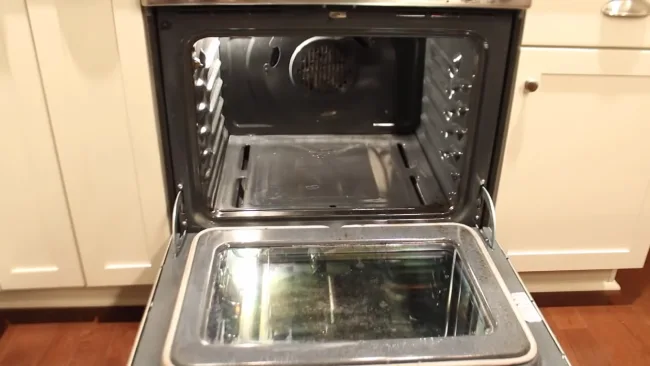
If you need help deciding which product to use or how to properly clean your self-cleaning oven, seeking professional help might be the best option. Professional cleaners have experience with different types of ovens and can ensure they’re thoroughly cleaned without causing harm.
Also, they can inspect and identify any potential issues with your appliance that could affect its performance in the future.
Is Easy-Off oven cleaner safe for self-cleaning ovens?
Easy Off oven cleaner is safe for use on self-cleaning ovens. This product is designed to work effectively on all types of ovens, including those with a self-cleaning feature.
This oven cleaner is formulated to clean and remove grease, grime, and baked-on food residue from your oven without damaging the oven’s surface or inner components.
Using Easy Off is incredibly simple. All you have to do is spray the cleaner inside your oven, wait for the recommended time specified in the instructions, and then wipe the surface clean.
How do you clean a self-cleaning oven that no longer self-cleans?
If your self-cleaning oven is no longer self-cleaning or doesn’t clean as effectively as it used to, you can do a few things before giving up and purchasing a new one.
One option to consider is using an abrasive scouring pad. Abrasive scouring pads are designed to help remove tough stains and residue from your oven’s surface.
But choosing a non-scratch pad and using it carefully to avoid damaging the oven’s surface is essential. Be gentle and work slowly and methodically, ensuring you don’t harm any of the oven’s components.
Keep Your Self-Cleaning Oven in Top Condition: Use Non-Toxic Oven Cleaners
Although using oven cleaners on self-cleaning ovens is not recommended, you can use them occasionally. The risks of chemical reactions and damage to the interior can outweigh any potential benefits. It’s important to read your oven’s manual and follow manufacturer guidelines for cleaning.
If you need to clean your self-cleaning oven, there are non-toxic cleaners available that won’t harm your appliance or pose a risk to your health. And remember, regular maintenance and troubleshooting can prevent major issues from occurring in the first place.
If all else fails, seeking professional help is always an option. Taking proper care of your self-cleaning oven will ensure its longevity and continued safe use for years.

